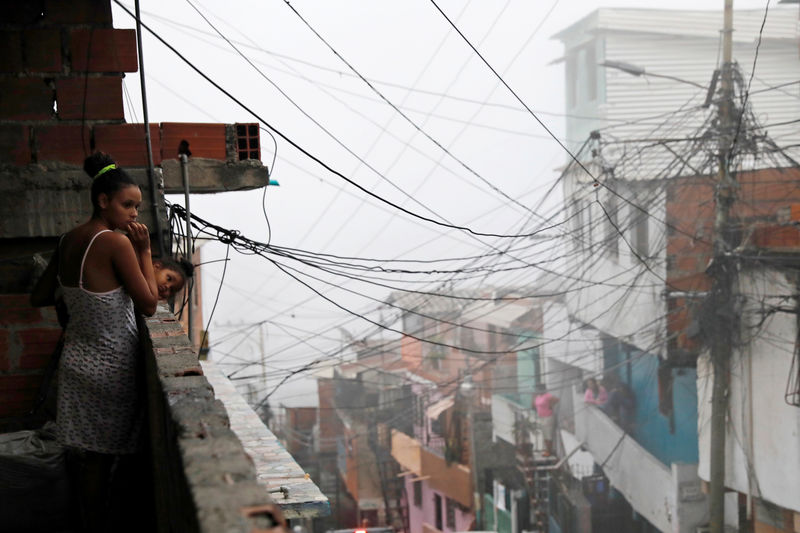By Vivian Sequera and Brian Ellsworth
CARACAS (Reuters) - Venezuela's power supply remained patchy on Friday after the worst blackout in decades paralysed most of the country, exacerbating hardship for millions of people already suffering from hyperinflation and widespread shortages of basic goods.
Power went out across the recession-stricken country on Thursday afternoon due to a problem at Venezuela's main hydroelectric plant, the government said, calling the event an act of "sabotage" by ideological adversaries.
Power returned to some parts of the capital of Caracas during the afternoon but quickly cut out again, according to witnesses and local media, threatening to extend what is already the longest blackout under 20 years of socialist leadership.
Neither Socialist Party officials nor state power company Corpoelec have provided further updates on the situation.
Opposition leader Juan Guaido, who most Western nations recognise as Venezuela's legitimate head of state, criticized the government for bungling the country's energy supply and said Maduro was the one sabotaging the nation.
"Sabotage is stealing money from Venezuelans. Sabotage is burning food and medicine. Sabotage is stealing elections," Guaido said on Twitter.
Humanitarian aid trucks went up in flames last month when Maduro deployed troops at the Colombian border to prevent the opposition from bringing in relief supplies.
Despite international outcry at Maduro's decision to turn back the aid convoy, Elliott Abrams, U.S. President Donald Trump's special representative for Venezuela, on Friday ruled out the use of force to deliver humanitarian assistance.
Washington, which has led calls for Maduro to step down, pledged on Thursday to "expand the net" of sanctions against Venezuela, including more foreign banks providing financing to the government.
The United States in January levied crippling oil industry sanctions meant to starve Maduro's government of revenue.
China, which together with Moscow backs Maduro, issued a stern warning on Friday to Western nations about the risks in imposing sanctions and interfering in Venezuela.
"External interference and sanctions will only exacerbate the tense situation," said the Chinese government's top diplomat, State Councillor Wang Yi. "There's already enough of such lessons from history, and the same old disastrous road should not be followed."
Adding to Venezuela's economic woes, a World Bank arbitration tribunal ruled on Friday that Maduro's government must pay ConocoPhillips (NYSE:COP) more than $8 billion (£6.15 billion) for seizing the oil and gas company's oil assets as part of a wave of nationalizations. Venezuela can still contest the award.
SOME POWER BACK
It was not immediately clear if the outage has affected oil operations in the OPEC nation. State oil company PDVSA did not respond to a request for comment.
In the upscale Caracas neighbourhood of Los Palos Grandes, several hundred people gathered for an opposition rally where Guaido spoke.
"Everyone is hoping that with Guaido, the country will go back to being normal," said Yamila Oliveros, a 53-year-old architect. "That's all a person wants, to live normally. That when I open the tap, water comes out. That when I flip the light switch, the lights come on."
The opposition has set protests for Saturday in the capital as it seeks to maintain pressure on Maduro to step down.
Venezuela has become mired in a major political crisis since Guaido declared himself the president in January and denounced Maduro as an usurper.
Maduro says Guaido is a "puppet" of Washington and dismisses his claim to the presidency as an effort by the Trump administration to control Venezuela's oil wealth.
Maduro, who was re-elected last year in a vote widely viewed as fraudulent, blames Venezuela's economic crisis on a U.S.-backed campaign to wreck the economy and force him from power. Maduro has consistently attributed major power outages to sabotage by opposition adversaries, without providing evidence.
Government officials on Thursday said the massive Guri dam was damaged by a cyber attack, and initially said power would return within three hours. They have not updated their timetable.
"We will once again defeat this electrical sabotage. We are going to recover this important service for the population," Vice President Delcy Rodriguez said in comments broadcast over state television.
Thermoelectric plants, which are meant to back up the hydroelectric dam, are operating well below capacity, said Miguel Lara, an electrical engineer who formerly ran a state agency that oversaw the national power grid.
Some 3.4 million migrants and refugees have left Venezuela amid the crisis, according to the United Nations.
The U.N. refugee agency said on Friday that Venezuelans lodged nearly one-quarter of a million asylum applications in 2018 alone, double that of the previous year.
Maduro's critics say his government has mismanaged the power sector since late socialist leader Hugo Chavez nationalized it in 2007 while setting aside billions of dollars for power projects that were swallowed by corruption.
Venezuela suffered major blackouts in 2008 and 2013 that affected significant parts of the country, but they were resolved in less than six hours.

Local power outages continue to be chronic, particularly in the sweltering western state of Zulia where residents complain of days without power or with limited electricity and voltage fluctuations that damage appliances.